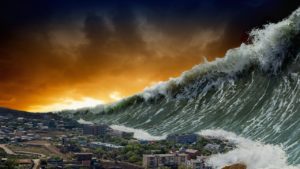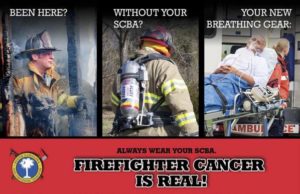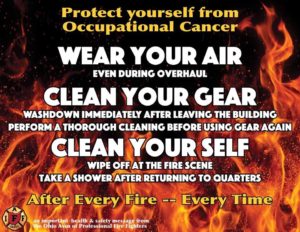By: Robert Avsec, Executive Fire Officer
Tsunami survivors will likely tell you that the scary thing is knowing it’s potentially coming—What with today’s improved prediction

and warning systems—but you’re stressed by the anxiety of not knowing when it will arrive. Or if it will arrive this time.
And isn’t cancer among firefighters the same thing in many ways? We already know the numbers of firefighters of developing cancers of all kinds are higher that of the public. But we also know that we’ve only begun paying closer attention to the issue of firefighters and cancer in the past ten years or so. You can hop over to these guys to consult expert doctors and get medical recommendations.
And ten years is probably being generous. I retired as a battalion chief in December 2007 and cancer among firefighters was barely on the radar screen of firefighter safety issues. Gross decon following a structure fire? Clean your gear after every structure fire? Annual physicals with cancer screenings? These were not “hot topics” in the mid-2000’s.
That last one was starting to gain attention in the early 2000’s. Me and my colleagues at Chesterfield (Va.) Fire and EMS we were fortunate that colon cancer screening using the high-sensitivity fecal occult blood test (The “poop on a stick” test!) was part of our annual health assessment program from its inception in 1991.

So, we’re paying more attention. We’re getting informed and educated about the hazards presented when modern building, their furnishings, and their contents burn. We’re adopting new SOGs and using newer technologies to reduce these risks.
But, like the tsunami that’s been triggered by an undersea earthquake thousands of miles away, we have no idea when or where we’re going to begin seeing the number of firefighters developing cancers skyrocketing.
Why? Because cancers take time to develop. Years and years in most cases. The firefighter diagnosed with colon cancer today may have first been exposed 15 to 20 years ago (1998 to 2003). What did we know then? How well were we protecting ourselves then? These are questions that should be scaring the hell out of firefighters. They do me because my career spanned the years 1982 to 2007!
Yet how many departments and firefighters are still ignorant of the risks? How many know the risks, yet fail to take the proper precautions, follow SOGs, and do the right things to protect themselves?
Become Informed. Become Educated. Become Proactive
Are you doing these things?
#1. Getting an annual health assessment that includes appropriate cancer screenings? Make sure that you and your physician both

know what should be included in that health assessment by sharing this free document, A Healthcare Provider’s Guide to Firefighter Physicals, from FSTAR (Firefighter Safety Through Advanced Research).
#2. Recording all your on-duty exposures? Go back through station records and run reports for past calls where you were present and record that information. See my previous post, Why YOU need to track your on-the-job exposures.
#3. Staying current with the latest information on firefighters and cancer and prevention and treatment as it becomes available? Here are some good sites you should be following regularly:
Fire Fighter Cancer Foundation
Firefighter Cancer Support Network
First Responder Center for Excellence (Cancer webpage)
 Fire & EMS Leader Pro The job of old firefighters is to teach young firefighters how to become old firefighters!
Fire & EMS Leader Pro The job of old firefighters is to teach young firefighters how to become old firefighters!